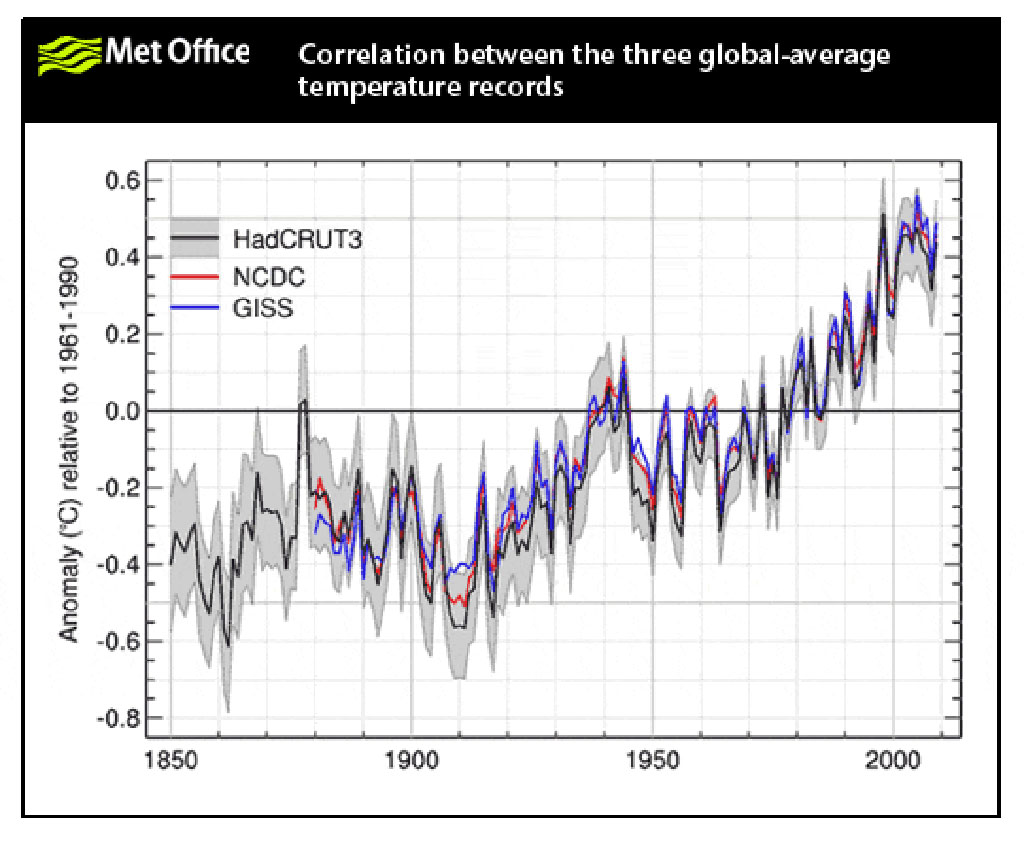Met Office: global warming predictions revised down
The Met Office announces the world is not going to warm up as much as previously thought. Surprising news, as last week it said UK rainfall could keep breaking records because of global warming.

The analysis suggests that by 2017 there will be 20 per cent less warming than predicted by Met Office forecasters in 2011.
Those critical of the idea of man-made global warming have seized upon the announcement. To them, it reveals a problem with the fact that the Met Office and journalists continue to report about run-away global warming while global average temperature records have not increased significantly (statistically speaking) since 1997.
So have the Met Office (and journalists) got it wrong on climate change?
First take a look at the annoucement.
Inherent uncertainities
Their 2011 estimate (taking the most likely average temperature difference from the 1971 to 2000) was an increase of 0.54 degrees centigrade. The inherent uncertainties in the forecasting model meant that number might be as low as 0.36 and could be as high as 0.72 degrees C.
The new estimate puts the figure at 0.43 degrees (with an error of 0.28 to 0.59).
Slightly more than 0.1 of a degree is hardly a shocking down-revision of the numbers.
However the finding does highlight an apparently awkward problem for the climate scientists. The IPCC – the international arbiter of all things climate change – predicted in its last report an average temperature increase of 0.2 degrees per decade.
Increasing levels of greenhouse gasses should mean global temperatures should be rising fairly steadily.
Average temperature ‘hardly risen’
But in the last few years, though temperature records around the globe have been smashed , the global average temperature has not really gone up that much at all.
A fact that is now reflected in the Met Office re-analysis.
The Met Office have never denied the absence of significant average warming since 1997, saying in a statement today they are “actively researching potential causes of the recent slowdown in global warming”.
It is possible, they say, that natural changes in solar activity, soot and dust in the atmosphere and natural cycles here on earth could be influencing the recent stabilisation.
So does this mean global warming has stopped or does not exist? Definitely not. If you had any doubts the graph below shows how global temperatures have gone up over a longer timescale than since 1997 (this graph is based on three independent temperature records which all agree fairly well).

Could the vague stabilisation in global average temperatures mean global warming will not get any worse?
The overwhelming burden of scientific evidence supported by observations of past climate and constantly improving computer models suggests that on longer timescales temperatures can only continue in one direction: up.
It will not be as rapid and catastrophic as some of the worst doomsayers suggest but increases of between 2 and 4 degrees centigrade by 2100 remain the best estimates around.
What is more, fairly short term snapshots of global average temperatures ignore the ups and downs in temperatures that are just as significant.
“I despair of the way data such as this is translated as ‘global warming has stopped’. Global mean temperatures – whether measured or predicted – are not the issue. What matters is the energy balance of the planet and the changes that an energy imbalance will drive in the climate system – as well as the consequences for humans,” said Chris Rapley, a climate scientist at University College London.
If anything, the Met Office’s down-revision of their estimates shows how the science of climate change is maturing hopefully to give more realistic projections.
As Myles Allen, a climate modeller at the University of Oxford put it: “While every new year brings in welcome new data to help us rule out the more extreme (good and bad) scenarios for the future, it would be equally silly to interpret what has happened since the early-2000s as evidence that the warming has stopped.”
-
Latest news




